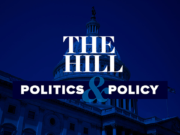This piece originally appeared in Washington Examiner on November 2, 2020.
Fans of the new Borat sequel should thank the Supreme Court’s much-maligned and misunderstood Citizens United decision. Without that ruling, America would resemble the autocratic regime in Borat’s Kazakhstan in the government’s ability to literally ban the Subsequent Moviefilm from release before the election.
The Citizens United ruling was about a movie. Shortly before the 2008 Iowa caucuses, a nonprofit corporation called Citizens United released Hillary: The Movie. As the Supreme Court described the film: “The movie, in essence, is a feature-length negative advertisement that urges viewers to vote against Senator Clinton for President. … The film would be understood by most viewers as an extended criticism of Senator Clinton’s character and her fitness for the office of the Presidency. … The movie concentrates on alleged wrongdoing during the Clinton administration. … There is no reasonable interpretation [of the film] other than as an appeal to vote against Senator Clinton.”
Before Citizens United, the government could essentially put corporations (including nonprofit organizations) in a cage, like the women in Borat’s Kazakhstan, if they spoke about candidates, including in the form of a movie. Unless the Federal Election Commission or a court recognized a corporation as a “legitimate press entity” performing a “legitimate press function,” a corporation was prohibited from distributing any speech deemed to be a campaign “expenditure” or “electioneering communication.” In one fell swoop, Citizens United changed all that. The ruling freed corporations to distribute literature, movies, and other forms of speech about candidates and elections.
The overtly political Subsequent Moviefilm, which was released by a major corporation less than two weeks before Election Day, bears many legal similarities to Hillary: The Movie and has Citizens United to thank for its existence. Specifically, the plot centers around having the Borat character attempt to bribe Vice President Mike Pence so that President Trump will embrace the autocratic leader of Borat’s Kazakhstan in the same manner that Trump allegedly embraces other foreign “tough guy leaders.” The “prodigious bribe” cannot be given directly to Trump because, as one scene depicts, Borat had defecated on the Trump Tower plaza.
The movie pointedly features footage of Pence speaking at the CPAC convention in late February, stating that the novel coronavirus was under control. The bribe itself starts in the form of a monkey, but when Borat’s daughter eats the monkey, the bribe becomes the daughter herself. When efforts to “gift” Borat’s daughter to Pence fail, the target of the bribe becomes any key associate of the president, many of whom, the film notes, were in jail. The target ultimately lands on Trump’s high-profile personal attorney, Rudy Giuliani. In a widely reported scene, Borat’s fictional underage daughter apparently attempts to seduce Giuliani, who is portrayed as not resisting.
In other scenes, the film portrays Trump supporters as racists and conspiracy theorists. In front of a crowd with members flying Trump campaign flags, the Borat character belts out a song that promotes injecting various adversaries with the “Wuhan flu” or “chop[ping] them up like the Saudis do.” The film concludes with what political ad makers and campaign finance attorneys know as a “call to action” — “Vote or … be execute” [sic].
Campaign finance statutes and many regulators, judges, and policymakers around the country have deemed many of these features of the Subsequent Moviefilm to be “indicia” of campaigning or “electioneering.” To sum up, the film: 1. Portrays opposition to Trump; 2. Features extended criticism of Trump’s character, qualifications, and fitness for office; 3. Points to wrongdoing by Trump’s close political associates; 4. Casts Trump supporters and the administration in a negative light; 5. Includes an election-related call to action; and 6. Is being released shortly before the election.
The Borat sequel is clearly over-the-top satire. However, the campaign finance legal considerations it implicates are very serious and real. Prior to Citizens United and a corresponding, oft-derided pro-free speech movement at the FEC over the past decade, the government could have stopped a corporation from distributing the Borat sequel before the election. Such a regime is more befitting of Borat’s homeland. Thanks to the Supreme Court’s ruling, we are free to watch the Subsequent Moviefilm before the election.














